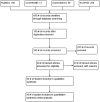Systematic review and meta-analysis of studies comparing baseline D-dimer level in stroke patients with or without cancer: Strength of current evidence
- PMID: 38476438
- PMCID: PMC10927037
- DOI: 10.25259/JNRP_379_2023
Systematic review and meta-analysis of studies comparing baseline D-dimer level in stroke patients with or without cancer: Strength of current evidence
Abstract
Objectives: D-dimer levels are increased in stroke and cancer. Cancer patients are at a higher risk of stroke. However, the evidence is unclear if high D-dimer in stroke patients can suggest the diagnosis of concomitant cancer or the development of stroke in a cancer patient. The objective is to assess the evidence available on the baseline D-dimer level in stroke patients with and without cancer.
Materials and methods: We conducted the systematic review and meta-analysis using the Preferred Reporting Items for Systematic Reviews and Meta-analysis guidelines. We searched PUBMED, Cochrane, ScienceDirect, and Scopus for potentially eligible articles published till June 2023. All the review steps were iterative and done independently by two reviewers. The Newcastle-Ottawa scale tool was used to assess the quality of included studies for case control and cohort studies and the Agency for Healthcare Research and Quality tool for cross-sectional studies. The qualitative synthesis is presented narratively, and quantitative synthesis is shown in the forest plot using the random effects model. I2 of more than 60% was considered as high heterogeneity.
Results: The searches from all the databases yielded 495 articles. After the study selection process, six papers were found eligible for inclusion in the qualitative and quantitative synthesis. In the present systematic review, 2651 patients with ischemic infarcts are included of which 404 (13.97%) patients had active cancer while 2247 (86.02%) did not. The studies included were of high quality and low risk of bias. There were significantly higher baseline D-dimer levels in stroke patients with cancer than in non-cancer patients with a mean difference of 4.84 (3.07-6.60) P < 0.00001.
Conclusion: D-dimer is a simple and relatively non-expensive biomarker that is increased to significant levels in stroke patients, who have cancer and therefore may be a tool to predict through screening for active or occult cancer in stroke patients.
Keywords: Cancer; Cerebral infarction; D-dimer; Prognosis; Stroke.
© 2024 Published by Scientific Scholar on behalf of Journal of Neurosciences in Rural Practice.
Conflict of interest statement
There are no conflicts of interest.
Figures


Similar articles
-
Beyond the black stump: rapid reviews of health research issues affecting regional, rural and remote Australia.Med J Aust. 2020 Dec;213 Suppl 11:S3-S32.e1. doi: 10.5694/mja2.50881. Med J Aust. 2020. PMID: 33314144
-
The future of Cochrane Neonatal.Early Hum Dev. 2020 Nov;150:105191. doi: 10.1016/j.earlhumdev.2020.105191. Epub 2020 Sep 12. Early Hum Dev. 2020. PMID: 33036834
-
The effect of exposure to long working hours on stroke: A systematic review and meta-analysis from the WHO/ILO Joint Estimates of the Work-related Burden of Disease and Injury.Environ Int. 2020 Sep;142:105746. doi: 10.1016/j.envint.2020.105746. Epub 2020 Jun 3. Environ Int. 2020. PMID: 32505015
-
Reduction in total leukocytes in malaria patients compared to febrile controls: A systematic review and meta-analysis.PLoS One. 2020 Jun 23;15(6):e0233913. doi: 10.1371/journal.pone.0233913. eCollection 2020. PLoS One. 2020. PMID: 32574170 Free PMC article.
-
Small class sizes for improving student achievement in primary and secondary schools: a systematic review.Campbell Syst Rev. 2018 Oct 11;14(1):1-107. doi: 10.4073/csr.2018.10. eCollection 2018. Campbell Syst Rev. 2018. PMID: 37131395 Free PMC article.
References
Publication types
LinkOut - more resources
Full Text Sources

